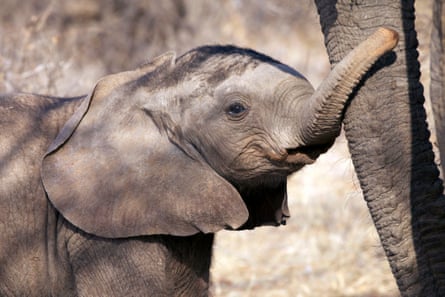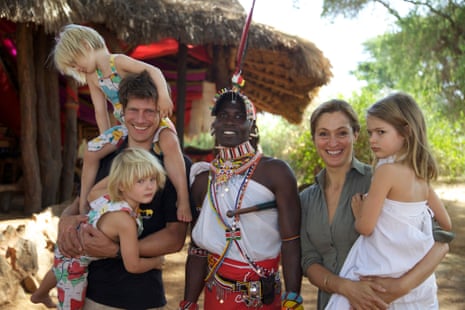Most British parents worry about their children crossing the road safely. Saba Douglas-Hamilton worries about snakes and scorpions.The 45-year-old wildlife filmmaker lives with her husband, Frank Pope, 42, and their daughters Selkie, six, and four-year-old twins, Luna and Mayian, in Kenya’s Samburu national reserve. It has no paved roads, is sparsely populated by nomadic herders, the long grasses teem with snakes, and crocodiles wait in the shallow river. For the family, this wild patch of Africa is paradise. The upcoming 10-part BBC series This Wild Life follows their daily dramas as they raise their young children while running an eco-lodge and conservation charity.
Saba is no stranger to this kind of life. Her own childhood, living in the wild, war-torn corners of Africa, was a crash course in survival. She and her younger sister, Dudu, spent days in the back of a Jeep tracking elephants with their Scottish father, zoologist Iain Douglas-Hamilton, and Italian mother, Oria. They washed in crocodile-infested rivers while their dad kept watch, and slept under the stars with nothing but a mosquito net. They had family holidays in Lamu on the Kenyan coast, where they fished for Nile perch and rode horses bareback.
Saba’s parents were pioneering conservationists, who, after spending decades studying elephants, created the space to preserve these wondrous creatures that are still being killed in their thousands. They wrote Among the Elephants in 1975, then, in 1992, Battle for the Elephants, recounting their 10-year struggle to alert the world to the wholesale slaughter of African elephants that contributed to the 1989 international ban on the ivory trade.
The family flew into Uganda in 1980 amid the chaos after Idi Amin’s fall, and saw bloated, bullet-riddled elephant carcasses littering the landscapes. Saba’s face glows as she recounts this free, desperate time. “We lived in a shell of a house with no windows or doors. Everything had been blown to pieces, every building was looted and all these crazy drunk soldiers were rampaging through the streets. And we were out in the sticks in a national park. We slept on the floor and stuffed safari chairs into the door to stop the hyenas coming in at night. We had orphaned mongooses, genets and a vulture as pets. We were living on the Nile with all these enormous crocodiles. There was a man who had his leg bitten off by one and came round to play games with us. My sister and I loved it. I felt privileged being introduced to an unadulterated wilderness and have sought that freedom ever since. I believe in that very much with my own kids.”
She compares growing up in the bush to being raised on a farm, and doesn’t want to shelter her daughters from the gritty realities of life. “There’s a wonder in everything.”
A couple of years ago, Saba found herself stuck in a Nairobi suburb, pining for her old life crisscrossing the globe for the BBC’s Big Cat Diary and The Secret Life of Elephants. “I was going a bit mad from the feeding, changing and caring. You go through that thing as a mother and feel like you’ve lost your identity,” she says. “So when my mum asked for help running the camp, I took the kids out of school and came out here. At the same time, Frank left his ocean life. This camp, for us, is a marvellous experiment, which is working, providing a place for people to come and be immersed in this beautiful wilderness.”
She met Frank at a friend’s wedding in London in 2004. He’d been working as a marine archaeologist on shipwrecks off Mozambique, Vietnam and the Cape Verde islands. “I made damn sure the man I thought I’d marry fell in love with Africa. I said, ‘Of course we can go live anywhere in the world, but come and see Kenya first.’” While he still misses the sea, Frank joined Save the Elephants as chief of operations, working alongside Saba and her father to fight the resurgent ivory trade.
As we sit beneath the acacias that shade her family’s tented Elephant Watch camp, she talks about how being out in nature fires a child’s imagination. “When we arrived, the kids were allowed to bring one little dolly and books. They found these seeds and painted faces on them,” she says, picking up a long sausage-like fruit fallen from the kigelia trees. “They wrapped them up and carried around these heavy babies. They draw in the sand, build fairy houses in the trees, and that’s the magic of it – to see their inventiveness. They’re like my little puddle ducks, always walking behind me when I’m talking to my guests and guides.”
For all its charms, living in such isolation is challenging. “It’s lovely walking around barefoot all day and watching my kids playing with animals and the local children, but it’s tough,” she says. “There’s no shop around the corner. If the Jeep breaks down there’s no mechanic, or if anyone gets sick or hurt, the doctor is hours away. You really have to be self-reliant and prepared for the unexpected.”
For the kids, living in the bush can be hard as they crave other children. “They’re social little creatures and bond deeply with the kids of guests – which always follows with goodbyes and heartbreak. Whenever the river’s low they go across with a warrior and play with the nomads’ children in the encampment. They milk the goats and watch goat kids being born and they find it exciting.”

Just beyond the cosy circle of the open-air mess tent, with its snug sofas and stacks of books, a huge elephant appears. “It’s Anwar, one of the young bulls,” she whispers, her smile widening. “He’s coming to feast on the seed pods. They think this is their patch, too. Anwar’s so friendly he tries to climb into the car.”
There are no fences around the camp, where the wildlife and some 900 elephants roam freely. “We get everything coming through,” she explains, unfazed. “Bats flying into tents, monkeys looting the place. We have a gorgeous little genet cat that comes by for dinner every evening. Leopards, lions, wild dogs … each morning you read their exploits from paw-prints in the sand. I want my children to be fascinated by the natural world and to see the beauty of everything. I love hearing the girls talk about a scorpion with affection. Lions, elephants and snakes are much more predictable than human beings.”
Britt Collins was accommodated by Aardvark Safaris (aardvarksafaris.co.uk, 01980 849160) and flew on Kenya Airways (kenya-airways.com).
This Wild Life begins on BBC2 on 31 August, 7pm. To donate to Save the Elephants, visit savetheelephants.org
